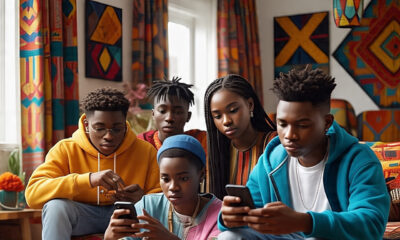Career
Juliet Ehimuan: Technology is Helping to Transform Education in Africa
Previously, in order to access the wealth of knowledge in books, one had to go to a physical library. Now the whole world is our library. With a mobile phone that is connected to the Internet, we have access to the world’s information at our fingertips.
 Technology is having an increasingly transformational impact on education. It’s affecting a broad range of areas from how students learn, to how educators enhance their own skills. It is enriching classroom environments, as well as impacting how administrators manage grades, maintain security, and track payments.
Technology is having an increasingly transformational impact on education. It’s affecting a broad range of areas from how students learn, to how educators enhance their own skills. It is enriching classroom environments, as well as impacting how administrators manage grades, maintain security, and track payments.
Previously, in order to access the wealth of knowledge in books, one had to go to a physical library. Now the whole world is our library. With a mobile phone that is connected to the Internet, we have access to the world’s information at our fingertips.
Using Google search, you can research any topic and find relevant, factual data. Dictionaries, encyclopaedias, research materials—everything is now online, updated in real time, and changing the way we think about our world. Increasingly, platforms like YouTube are serving as classrooms, where people can find instructional aids and develop new skills on virtually any subject.
Technology has taken learning beyond the classroom, and advancement is no longer limited to curriculums and test scores. The internet has democratised access to information and created trailblazers from the most unlikely backgrounds. Innovation, design, function and solutions are increasingly coming from African youths armed with a smartphone and the desire to broaden their horizons.
Take the case of Osine and Anesi Ikhianosime, two amazing Nigerian kids, who at the age of 9 and 11 respectively, taught themselves to write code and built a functional, fast browser for feature and low-end phones. In Namibia, 19-year-old Kapenda Ndimuwanakupa, who completed his education in a state-run secondary school in Windhoek, was able to secure a media internship in Germany by crowdfunding to partly cover his costs, using a video he posted on YouTube.
Technology is allowing teachers to expand their influence beyond the classroom. With lessons on sites like YouTube, as well as using video conferencing platforms and chat platforms, they can provide lessons to students and offer guidance, regardless of time and place. Learning, at whatever age and for whatever purpose, can now be done using real life, real time demonstrations; and mundane lessons can be brought to life through the use of technology.
Technology will continue to drive the future, and Africa has plenty to gain from its far-reaching applications. Our most pressing challenges can be solved in radically different ways, a lot quicker and more cost effectively, with technological advancements like Artificial Intelligence and Machine Learning. To bring the continent to the forefront of advancement, we must establish education that serves to prepare our youth for the future, education that harnesses every tool possible to solve problems.
Embracing innovation can help sub-Saharan Africa to bridge the education gap that currently exists. And this is already happening, as Africans break barriers through education and technology. Eneza Education, with its reliance on SMS, is one such example. The private sector program operating in Ghana, Kenya, Tanzania, and Zimbabwe provides students with mobile access to lessons and quizzes connected to the national curriculum.
The next billion users of technology will come from emerging markets like Africa. This new phase will incorporate age-old principles with new-age learning, and will conquer frontiers to create a continent that will stand shoulder to shoulder with the rest of the world. Leveraging the power of technology in education is critical in making this happen.
Last week, we held our third Google for Nigeria event, and it provided a great opportunity to reflect on how we are working to help enable this new African reality. The role of Google search is perhaps the most obvious interaction that people have with Google in the educational space. But Google search is just one of many programs and products designed to impact Africa and Africans. There can be no sustainable way to leverage the power of technology without skilled users and developers. Google has pledged to train 10 million Africans by 2021, and 4 million have been trained so far – two million of whom are Nigerians. We have also successfully trained 15,000 developers and are committed to training 100,000 in total.
We now have the tools to make sure no one is left behind. With technology, we can create our own solutions, transform our reality, and bring to life what seems impossible: challenging the norm and changing the Africa narrative.




















